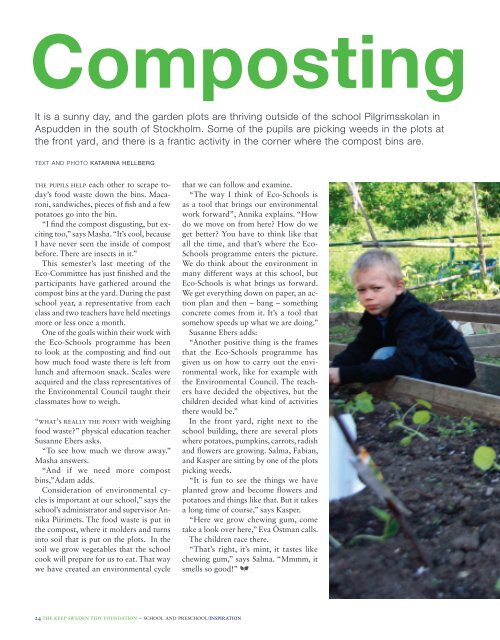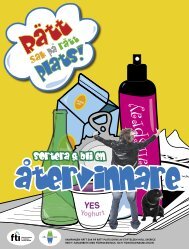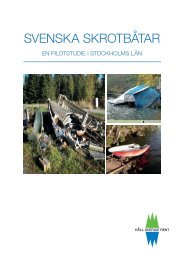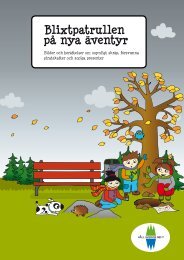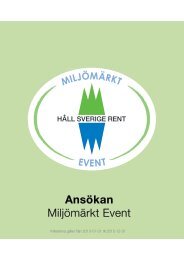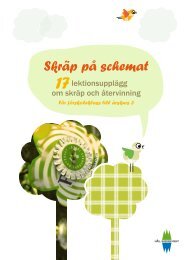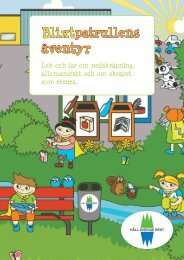KEEP SWEDEN TIDY - Håll Sverige Rent
KEEP SWEDEN TIDY - Håll Sverige Rent
KEEP SWEDEN TIDY - Håll Sverige Rent
You also want an ePaper? Increase the reach of your titles
YUMPU automatically turns print PDFs into web optimized ePapers that Google loves.
Composting<br />
It is a sunny day, and the garden plots are thriving outside of the school Pilgrimsskolan in<br />
Aspudden in the south of Stockholm. Some of the pupils are picking weeds in the plots at<br />
the front yard, and there is a frantic activity in the corner where the compost bins are.<br />
TEXT AND PHOTO KATARINA HELLBERG<br />
the pupils help each other to scrape today’s<br />
food waste down the bins. Macaroni,<br />
sandwiches, pieces of fish and a few<br />
potatoes go into the bin.<br />
“I find the compost disgusting, but exciting<br />
too,” says Masha. “It’s cool, because<br />
I have never seen the inside of compost<br />
before. There are insects in it.”<br />
This semester’s last meeting of the<br />
Eco-Committee has just finished and the<br />
participants have gathered around the<br />
compost bins at the yard. During the past<br />
school year, a representative from each<br />
class and two teachers have held meetings<br />
more or less once a month.<br />
One of the goals within their work with<br />
the Eco-Schools programme has been<br />
to look at the composting and find out<br />
how much food waste there is left from<br />
lunch and afternoon snack. Scales were<br />
acquired and the class representatives of<br />
the Environmental Council taught their<br />
classmates how to weigh.<br />
“what’s really the point with weighing<br />
food waste?” physical education teacher<br />
Susanne Ebers asks.<br />
“To see how much we throw away.”<br />
Masha answers.<br />
“And if we need more compost<br />
bins,”Adam adds.<br />
Consideration of environmental cycles<br />
is important at our school,” says the<br />
school’s administrator and supervisor Annika<br />
Piirimets. The food waste is put in<br />
the compost, where it molders and turns<br />
into soil that is put on the plots. In the<br />
soil we grow vegetables that the school<br />
cook will prepare for us to eat. That way<br />
we have created an environmental cycle<br />
24 the keep sweden tidy foundation – school and preschool/inspiration<br />
that we can follow and examine.<br />
“The way I think of Eco-Schools is<br />
as a tool that brings our environmental<br />
work forward”, Annika explains. “How<br />
do we move on from here? How do we<br />
get better? You have to think like that<br />
all the time, and that’s where the Eco-<br />
Schools programme enters the picture.<br />
We do think about the environment in<br />
many different ways at this school, but<br />
Eco-Schools is what brings us forward.<br />
We get everything down on paper, an action<br />
plan and then – bang – something<br />
concrete comes from it. It’s a tool that<br />
somehow speeds up what we are doing.”<br />
Susanne Ebers adds:<br />
“Another positive thing is the frames<br />
that the Eco-Schools programme has<br />
given us on how to carry out the environmental<br />
work, like for example with<br />
the Environmental Council. The teachers<br />
have decided the objectives, but the<br />
children decided what kind of activities<br />
there would be.”<br />
In the front yard, right next to the<br />
school building, there are several plots<br />
where potatoes, pumpkins, carrots, radish<br />
and flowers are growing. Salma, Fabian,<br />
and Kasper are sitting by one of the plots<br />
picking weeds.<br />
“It is fun to see the things we have<br />
planted grow and become flowers and<br />
potatoes and things like that. But it takes<br />
a long time of course,” says Kasper.<br />
“Here we grow chewing gum, come<br />
take a look over here,” Eva Östman calls.<br />
The children race there.<br />
“That’s right, it’s mint, it tastes like<br />
chewing gum,” says Salma. “Mmmm, it<br />
smells so good!” a<br />
Facts/Pilgrimsskolan<br />
Location: Hägersten<br />
Municipality: the Municipality of<br />
Stockholm<br />
Type of school: Compulsory<br />
school, age 6–11<br />
Number of pupils: 120<br />
Number of years with Eco-<br />
Schools: 1


